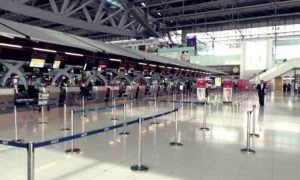Tourism and COVID-19: Unprecedented Economic Impacts
Only through collective action and international cooperation will we be able to transform tourism, and advance its contribution to the 2030 Agenda.
Tourism is one of the world’s major economic sectors. It is the third-largest export category (after fuels and chemicals). In 2019, the sector accounted for 7 per cent of global trade.  For some countries, it can represent over 20 per cent of their GDP and, overall, it is the third largest export sector of the global economy.
For some countries, it can represent over 20 per cent of their GDP and, overall, it is the third largest export sector of the global economy.
Tourism is one of the sectors most affected by the COVID-19 pandemic, impacting economies, livelihoods, public services and opportunities on all continents. All parts of its vast value-chain have been affected. Export revenues from tourism could fall by USD 910 billion to USD 1.2 trillion in 2020. This will have a wider impact and could reduce global GDP by 1.5 per cent to 2.8 per cent. Tourism supports one in 10 jobs and provides livelihoods for many millions more in both developing and developed economies. In some Small Island Developing States (SIDS), tourism has accounted for as much as 80 per cent of exports, while it also represents important shares of national economies in both developed and developing countries.
The COVID-19 crisis is an opportunity to rethink how tourism interacts with our societies, other economic sectors and our natural resources and ecosystems; to measure and manage it better; to ensure a fair distribution of its benefits and to advance the transition towards a carbon neutral and resilient tourism economy.
A new Policy Brief by the UN Secretary-General provides an overview of the socio-economic impacts from the COVID-19 pandemic on tourism, including on the millions of livelihoods it sustains. It highlights the role that tourism plays in advancing the Sustainable Development Goals (SDGs) including its relationship with environmental goals and culture. The brief calls on the urgency of mitigating the impacts on livelihoods, especially for women, youth and informal workers. Further, the brief provides recommendations in five priority areas to cushion the massive impacts on lives and economies and to rebuild tourism with people at the center.
It features examples of governments support to the sector, calls for a reopening that gives priority to the health and safety of the workers, travelers and host communities and provides a roadmap to transform tourism.
Also Read : Technology to Drive Growth of Travel Industry Post-COVID
Massive Impact on Livelihoods
As many as 100 million direct tourism jobs are at risk, in addition to sectors associated with tourism such as labour-intensive accommodation and food services industries that provide employment for 144 million workers worldwide. Small businesses (which shoulder 80 per cent of global tourism) are particularly vulnerable.
Women, who make up 54 per cent of the tourism workforce, youth and workers in the informal economy are among the most at-risk categories. No nation will be unaffected. Destinations most reliant on tourism for jobs and economic growth are likely to be hit hardest: SIDS, Least Developed Countries (LDCs) and African countries. In Africa, the sector represented 10 per cent of all exports in 2019.
Mitigating Impacts on Nature and Culture
The sudden fall in tourism cuts off funding for biodiversity conservation. Some 7 per cent of world tourism relates to wildlife, a segment growing by 3 per cent annually. This places jobs at risk and has already led to a rise in poaching, looting and in consumption of bushmeat, partly due to the decreased presence of tourists and staff.
 The impact on biodiversity and ecosystems is particularly critical in SIDS and LDCs. In many African destinations, wildlife accounts for up to 80 per cent of visits, and in many SIDS, tourism revenues enable marine conservation efforts. Several examples of community involvement in nature tourism show how communities, including indigenous peoples, have been able to protect their cultural and natural heritage while creating wealth and improve their wellbeing. The impact of COVID-19 on tourism places further pressure on heritage conservation as well as on the cultural and social fabric of communities, particularly for indigenous people and ethnic groups. For instance, many intangible cultural heritage practices such as traditional festivals and gatherings have been halted or postponed, and with the closure of markets for handicrafts, products and other goods, indigenous women’s revenues have been particularly impacted.
The impact on biodiversity and ecosystems is particularly critical in SIDS and LDCs. In many African destinations, wildlife accounts for up to 80 per cent of visits, and in many SIDS, tourism revenues enable marine conservation efforts. Several examples of community involvement in nature tourism show how communities, including indigenous peoples, have been able to protect their cultural and natural heritage while creating wealth and improve their wellbeing. The impact of COVID-19 on tourism places further pressure on heritage conservation as well as on the cultural and social fabric of communities, particularly for indigenous people and ethnic groups. For instance, many intangible cultural heritage practices such as traditional festivals and gatherings have been halted or postponed, and with the closure of markets for handicrafts, products and other goods, indigenous women’s revenues have been particularly impacted.
As 90 per cent of countries have closed World Heritage Sites, there are immense socio-economic consequences for communities reliant on tourism. Further, 90 per cent of museums closed and 13 per cent may never reopen.
Also Read : Rural Tourism in Focus
Five Priorities for Tourism’s Restart
The COVID-19 crisis is a watershed moment to align the effort of sustaining livelihoods dependent on tourism to the SDGs and ensuring a more resilient, inclusive, carbon neutral, and resource efficient future. A roadmap to transform tourism needs to address five priority areas: a) Mitigate socio-economic impacts on livelihoods, particularly women’s employment and economic security; b) Boost competitiveness and build resilience, including through economic diversification, with promotion of domestic and regional tourism where possible, and facilitation of conducive business environment for micro, small and medium-sized enterprises (MSMEs); c) Advance innovation and digital transformation of tourism, including promotion of innovation and investment in digital skills, particularly for workers temporarily without jobs and for job seekers; d) Foster sustainability and green growth to shift towards a resilient, competitive, resource efficient and carbon-neutral tourism sector. Green investments for recovery could target protected areas, renewable energy, smart buildings and the circular economy, among other opportunities; and e) Coordination and partnerships to restart and transform sector towards achievingSDGs, ensuring tourism’s restart and recovery puts people first and work together to ease and lift travel restrictions in a responsible and coordinated manner.
Moving Ahead Together
As countries gradually lift travel restrictions and tourism slowly restarts in many parts of the world, health must continue to be a priority and coordinated heath protocols that protect workers, communities and travellers, while supporting companies and workers, must be firmly in place. Only through collective action and international cooperation will we be able to transform tourism, advance its contribution to the 2030 Agenda and its shift towards an inclusive and carbon-neutral sector that harnesses innovation and digitalisation, embraces local values and communities and creates decent job opportunities for all, leaving no one behind.
